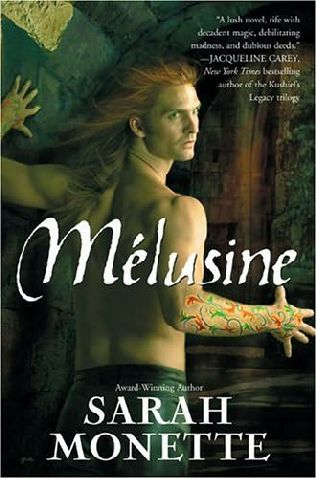Melusine; Sarah Monette

My introduction to Sarah Monette's writing was in a short story she wrote for a fantasy anthology titled The Winter Queen, my review HERE. Her voice was very strong and unique, I was immediately captivated. I went to the bookstore not long afterward & bought the only book of hers they had: Melusine. Time went by. More time went by. Eventually I found the second title (The Virtu) and bought that as well. Normally I only buy a series after I've tried the first title & like it enough to continue, but I made an exception for Ms. Monette. There are four books in the Doctrine of Labyrinths series. The next title in the series is The Virtu. I think this would be categorized as dark fantasy, explanation of that term here.
Before I attempt a plot overview, it'll be helpful to click here to read an explanation of the calendars used in Ms. Monette's series. A map is available as well, if you find that helpful in 'seeing' the action. The city of Melusine, set in an indeterminate late medieval/renaissance type world, is ruled by an aristocracy of magicians. The seat of their power, both political and magical, is a building called the Mirador. The populace uses one calendar system and those in power use another- that is only one of many ways class is delineated here. This is a world where indentured servitude is morally and legally permissable. In Melusine, one type of indentured servitude is called being a kept-thief, which, like indentured servitude, is a form of debt bondage.
Felix Harrowgate is a gay wizard living in the Mirador, whose lover is a member of the ruling family. In one horrifying episode, Felix's former master/owner Malkar (whichever term you prefer) uses Felix to break the symbolic focus of the magicians' power, called the Virtu. In so doing Malkar wraps Felix in powerful spells that break both his mind and his spirit. Malkar escapes, leaving Felix to shoulder the blame for what happened.
Down in the Lower City, former kept-thief and assassin Mildmay the Fox, who just happens to be multilingual (among his many talents), manages to stay one step ahead of the law & his enemies while earning a precarious living 'taking assignments', as it were, from people who need things done. Things that are definitely illegal. Another wizard,one Mavortian von Heber, from another country, uses magic that brings Mildmay to him. Von Heber wants Mildmay to help free/kidnap,depending on your point of view I suppose, Felix from wherever he is.
The narrative relates how Malkar manipulated & then ruined Felix in order to destroy the Virtu. How Malkar escapes. What happens to Felix. Who Mildmay is & what his life is like. Mildmay then meets von Heber & von Heber's brother Bernard, who hire him to either free or kidnap Felix, depending on your POV. This takes up roughly two thirds of the book. The remaining third tells how our intrepid little band (Mildmay, Bernard & von Heber) manage to get out of Melusine and find Felix. Then they cross the neighboring countries, sail over the sea & land in a place where the magicians there manage to heal Felix.
There is quite significant world building in this book. Much detail. Felix is an antihero- very difficult to like, even taking into consideration what was done to him. It's a safe bet to say I really don't like him much, but that's ok- he probably wouldn't like me much either. LOL :) Mildmay is more likeable: lives by his own code, his own sense of honor. He's actually a good person underneath the exterior shell he shows people, the one that he had to learn to keep himself alive in the Lower City of Melusine. I suspect Ms. Monette intended that one of them had to be more palatable in order to keep the reader invested. von Heber and Bernard, I came to like them all right, but I'm a cynical and suspicious reader & I wonder if they're really as harmless as they seem.
Hmmmmm..both Felix & Mildmay are red heads, which isn't found in Melusine. Mildmay, in fact, used to dye his hair to hide better. Wonder what that portends in the next book?? Favorite quote, p. 199:
"Consider the stars. Among them are no passions, no wars. They know neither love nor hatred. Did man but emulate the stars, would not his soul become clear and radiant as they are? But man's spirit draws him like a moth to the ephemera of this world, and in their heat he is consumed entire."



1 comment:
One of these days I am going to get around to reading this book!
Post a Comment